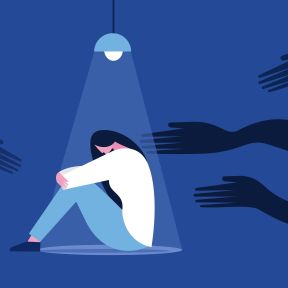
Sexual Abuse
Sexual abuse is any sexual activity that occurs without consent. Also referred to as sexual assault or sexual violence, it includes unwanted sexual touching, forced oral sex, and rape, among other sexual acts. No matter which act occurs, it’s not the survivor’s fault that they were assaulted—and help is available to begin healing from such abuse.
Contents
Sexual violence is a pervasive problem. The abuse can lead to shock, fear, sadness, and in some cases, an anxiety or depressive disorder. But therapy, coping skills, and social support can relieve the burden and help survivors heal.
Personal, societal, and legal hurdles often prevent survivors from disclosing the abuse and receiving the help they deserve. Although the #MeToo movement and the national discussion that ensued helped to address sexual harassment and assault, there’s still a long way to go to create cultural change and stop sexual violence.
Sexual violence is a pervasive problem. In America, one in three women and one in four men experience sexual violence in their lifetimes, according to the National Institutes of Health. And those numbers are likely an underestimate due to the shame and fear that prevent many survivors from reporting abuse.
Sexual abuse can be traumatic. In the two weeks following an assault, 94 percent of women in one study reported experiencing symptoms of post-traumatic stress disorder such as flashbacks, insomnia, hypervigilance, and avoidance. They also struggled with anger, anxiety, and depression. Yet up to 90 percent of survivors may recover naturally with time, research suggests. Mental health professionals are always available to help process this painful experience.
Most victims know their assailants: About 80 percent of sexual assaults are committed by someone the survivor knows, such as a neighbor, family member, or romantic partner, according to the Rape, Abuse and Incest National Network (RAINN). In cases where the offender remains in the survivor’s family or community, it can be especially scary to come forward.
Perpetrators of sexual assault tend to know the victim, have committed crimes or acts of aggresion in the past, and they tend to be adults, as more than half are over age 30, according to RAINN. Some may have a mental health condition such as antisocial personality disorder but the vast majority do not. There is no singular profile for people who commit sexual abuse.
Social and cultural influence also plays a role—particularly in why men sexually assault women. Society tends to glorify violence, objectify both women’s and men’s bodies, and embrace set cultural scripts and group norms. Challenging these norms communally and politically could help to change the troubling prevalence of sexual assault today.
One in six men will experience sexual violence in their lifetime, according to the Centers for Disease Control and Prevention. (But sexual violence statistics often underestimate the true prevalence due to underreporting.) Sexual assault occurred before age 18 for 94 percent of male victims, according to a 2009 study of more than 700 men in Virginia. Although the #MeToo movement ushered in a wave or progress for addressing sexual assault, men were largely left out of the national discussion.
Despite the awareness of widespread abuse in settings such as the Catholic Church, the Boy Scouts, and college sports teams, men face distinct challenges coming forward with allegations of sexual abuse. All victims of sexual violence contend with shame and humiliation, but men face an extra layer of stigma due to cultural notions about masculinity. Men may believe they should have been “strong enough” or “man enough” to fight the predator or avoid the assault. Cultural myths such as “men always want to have sex” can prevent men from speaking out about such abuse.
Survivors of sexual violence may experience physical injuries due to the assault, as well as anxiety, depression, and post-traumatic stress disorder. This can harm one’s health, career, and relationships.
Therapy can often effectively address the trauma of sexual abuse. Survivors learn how to identify and understand their emotions, process their memories, develop coping skills, apply stress-management strategies, and restore their confidence.
To find a therapist with experience treating sexual abuse or trauma, visit the Psychology Today Therapy Directory.
Although it can take a long time and multiple attempts, most people eventually leave abusive relationships. To make this decision, women have reported that it was crucial to 1) Confront reality and recognize that the abuse will not end 2) Release feelings of self-blame to reclaim self-esteem 3) Accept support and perspective from loved ones or a mental health professional 4) Reach a transition point with regard to feeling personally overwhelmed or consideration for a child’s well-being.
Trauma-focused therapies can be especially effective for survivors overcoming sexual assault. These include Cognitive Processing Therapy, Prolonged Exposure Therapy, and the somewhat controversial Eye Movement Desensitization and Reprocessing Therapy. Art therapy may also be a valuable outlet for individuals to process the trauma. If a dissociative disorder is present as a coping mechanism, it is important to treat the disorder so that its root cause can be addressed.
Dissociative identity disorder can emerge as a result of sexual abuse, especially in children. To treat this condition—the presence of more than one identity that takes control at different times—psychotherapy is the primary treatment. Nonverbal forms of therapy such as art, play, and hypnosis may be particularly valuable as they provide outlets for expression when verbal expression is too difficult. Therapy helps process the abuse and eventually achieve a singular, unified identity.
Powerful forces often prevent survivors from disclosing or reporting sexual abuse, from the fear of retaliation to the potential of reliving a traumatic assault. But when survivors do decide to come forward, unwavering support from friends and family members can help them process the experience and move forward.
If you’re concerned that a loved one is suffering sexual abuse, asking them directly can lead to relief, support, and treatment. The signs that an adult may have been sexually assaulted include:
• Anxiety about specific situations that didn’t previously prompt anxiety
• Avoiding specific people or places
• Persistent sadness or depression
• Low self-esteem
• Disturbed sleep or nightmares
• Self-harming behavior
• Suicidal thoughts
• New sexually transmitted infections
The most important thing to do is to simply listen and believe your loved one. Validate their emotions, ask questions, and avoid casting judgment. Help them explore options and resources, such as seeking medical attention, reporting the crime, calling an abuse hotline, or seeking therapy. Although you may have strong opinions, set those aside—the survivor should make every decision for themselves when they feel ready to do so.
Sexual assault often remains hidden due to a combination of denial, manipulation, and confusion. Victims of sexual assault may not report due to fear of retaliation, fear of not being believed, or fear of further experiencing the trauma. They may struggle with shame and consequently blame themselves for being “in the wrong place” or not “getting away.”
Victims also must contend with the cognitive biases that inform others’ beliefs when disclosing an assault. People want to believe that the world is a safe place, and it may be psychologically easier to blame the victim (“Well, she shouldn’t have been running alone at night”) than to accept that sudden abuse could happen to anyone.
People may also believe that perpetrators are inherently evil, so allegations against individuals like Larry Nasser or Bill Cosby, who others state to be nice people are not taken seriously. These biases and others fuel the cycle of victim-blaming that makes it difficult for survivors to come forward after an assault.
There are few offenses more painful to contemplate than child sexual abuse. Parents or loved ones may hesitate to raise such a concern with their child, but if they are worried, they should gently but directly ask. Ending any contact with the perpetrator and beginning therapy can help survivors of childhood abuse begin to heal, regardless of how recently the event occurred.
The signs that a child may have been sexually assaulted include:
• Sexually transmitted infections
• Genital injuries including bruising or bleeding
• Inappropriate sexual behavior or sexual knowledge
• Regressing to past habits such as bed-wetting or thumb-sucking
• New fear of removing clothing to change or bathe
• New fear of being alone at night or having nightmares
• New discomfort or anxiety around certain adults
• Excessive worry or fear
• Extreme agitation or angry outbursts
• Withdrawal from family and friends
If parents or caretakers are concerned about sexual abuse, they should gently but directly ask. While some children may bring up abuse themselves, many do not.
If an incident is suspected, avoid putting the child in situations in which they might encounter the potential offender or be in an unsupervised situation with an adult, until the matter is resolved.
If an incident is confirmed, report it. Reaching out to a rape crisis center, domestic violence center, or sexual assault hotline can help. (The National Sexual Assault Hotline number is 800-656-4673.)
Once the abuse has been reported, discuss next steps for the child with a doctor and mental health professional.
Some survivors of child sexual abuse dissociate to cope with chronic abuse, unconsciously disconnecting from reality to some degree. Dissociative disorders are more commonly found in victims of sexual abuse than among any other psychiatric population. Children who are 9 years old or younger are especially prone to dissociative disorders under conditions of severe sexual, physical, or emotional abuse.
Children can heal through trauma-focused therapy or therapy to process and address dissociation. Self-compassion may also be a key skill in overcoming past abuse. Survivors of child sexual abuse often struggle with shame and self-blame. Cultivating self-compassion—extending oneself the recognition, validation, and support that one would offer a loved one who is suffering—can neutralize shame. Self-compassion may provide emotional resilience and is linked to fewer mental health problems, research suggests.
Confusion, denial, fear, shame, and self-blame can lead adult victims of child sexual abuse to stay silent. Survivors could feel confused as to whether the events that occurred constitute abuse. They also may not remember the events clearly, due to the tendency for children to dissociate, or because the perpetrator gave them drugs or alcohol prior to the abusive act.
Survivors may also be in denial, unable to face the pain of admitting that abuse occurred. They could be fearful of the perpetrator’s threats, of not being believed, and of potential repercussions for the family. They may feel ashamed, due to the helplessness and humiliation they experienced. They may also still blame themselves for a range of unfounded reasons. These include messages conveyed by the perpetrator, or the fact that such a stance provides a semblance of control over an overwhelmingly painful situation.














